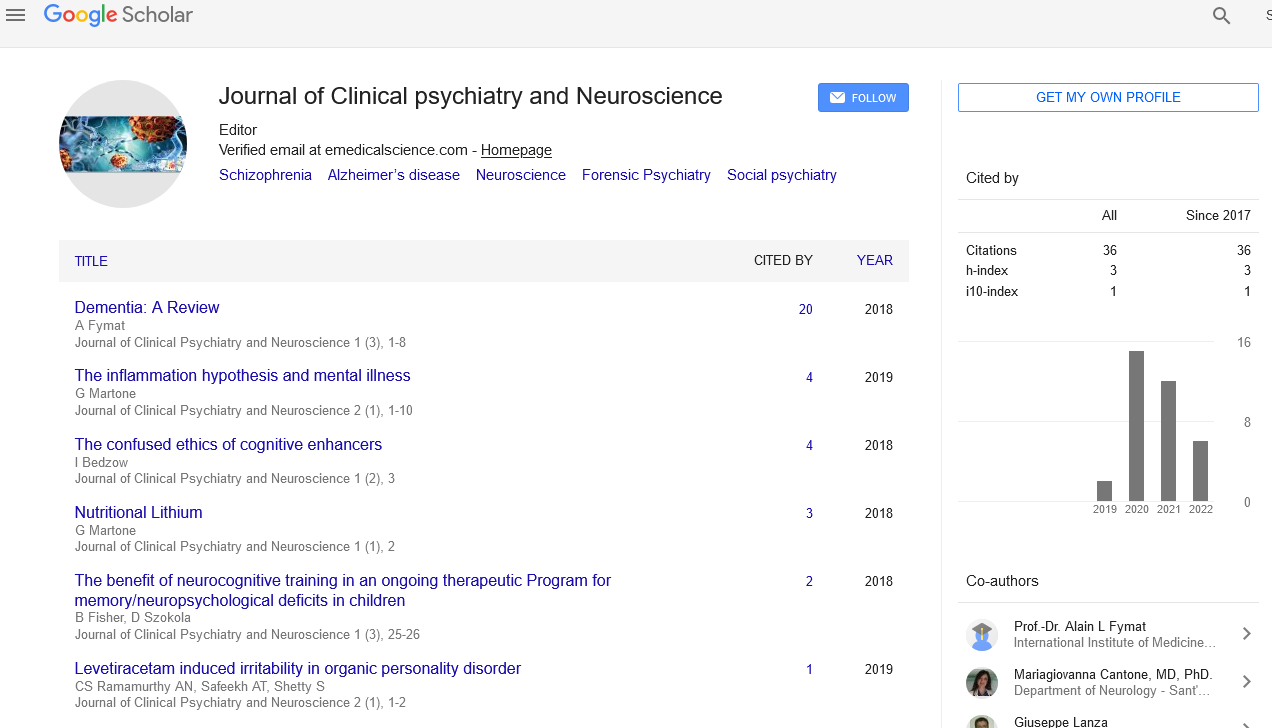Mentoring strategies in the ageing and dementia fields
Received: 07-May-2023, Manuscript No. puljcpn-23- 6585; Editor assigned: 09-May-2023, Pre QC No. puljcpn-23- 6585 (PQ); Accepted Date: May 26, 2023; Reviewed: 10-May-2023 QC No. puljcpn-23- 6585 (Q); Revised: 11-May-2023, Manuscript No. puljcpn-23- 6585 (R); Published: 27-May-2023, DOI: 10.37532/puljcpn.2023.6(3).110-11
Citation: Bhatia A. Mentoring strategies in the ageing and dementia fields. J Clin Psychiatry Neurosci. 2023; 6(3):110-11.
This open-access article is distributed under the terms of the Creative Commons Attribution Non-Commercial License (CC BY-NC) (http://creativecommons.org/licenses/by-nc/4.0/), which permits reuse, distribution and reproduction of the article, provided that the original work is properly cited and the reuse is restricted to noncommercial purposes. For commercial reuse, contact reprints@pulsus.com
Abstract
For science to continue to succeed and for medical discoveries to continue, mentoring the next generation of clinical researchers is essential. It is also a privilege and a duty for mentors who were also mentees in the past. The Harvard Ageing Brain Study and other research, along with the Mass General Brigham Centre for Alzheimer Research and Treatment, hosted a virtual retreat where discussions concerning mentorship took place. These discussions are summarized in this article. Clinical researchers working in the domains of ageing and dementia made up the majority of the presenters, moderators, and audience. The retreat's objectives were to explore mentoring generally in an academic setting using the example of dementia ageing and to concentrate on mentoring women.
Key Words
Alzheimer Research and Treatment
Introduction
Mentoring the upcoming generation of researchers is a crucial aspect of academic medicine and research. At its best, this connection has the potential to be fruitful and long-lasting; at its worst, it has the potential to be irritating and turn prospective clinician researchers away from the area. In collaboration with the Harvard Ageing Brain Study and related investigations, we organized a virtual mentorship retreat at the Mass General Brigham (MGB) Centre for Alzheimer Research and Treatment (CART) on October 13, 2020. The retreat was divided into four sections, each lasting an hour and including three to four speakers. An MGB faculty member moderated each session. Clinical researchers working in the disciplines of ageing and dementia made up the majority of the presenters and moderators.
The future generation of researchers must be educated in these varied complexities and beyond, given the essential need for more potent medicines for dementias like Alzheimer's. This includes educating more diverse researchers, who might then contribute to bridging the significant representational gap between varied communities in clinical research. As a result, discussing mentorship of women and different mentees was another objective of the retreat. Less leadership roles held by women and underrepresented minorities at academic medical centers have an impact on both clinical care and clinical research. A 2009 survey of more than 1,000 women faculty members at Harvard Medical School revealed that just over half had a mentor, and of those who did not, almost three quarters desired one.
Additionally, mentor availability was acknowledged as the most crucial quality, and mentoring gaps on negotiating techniques, career goals, finding collaborators, and work-life balance were found. Women were quite satisfied with the mentorship programmers that were provided, independent of the program's structure or focus, according to a new systematic assessment of mentoring of women in academic medicine, underlining the need to actively increase such programmers. Another systematic review with a focus on mentoring underrepresented minorities in academic medicine highlighted the dearth of publications about such programmers and identified a number of obstacles, such as inadequate participants, heavy burdens placed on mentors, and a lack of institutional funding for such initiatives.
In general, a good mentor instills in each mentee the belief that they are valuable on their own. The mentor assists the mentee in pinpointing their academic and professional goals. It's critical to consider the mentee's preferred methods of spending time rather than just the job title. When becoming specific, a good mentor focuses on providing the mentee with access to resources including analytic tools and data analysts, access to data and study participants, and introductions to colleagues (networking/sponsorship). Early on and over time, the mentor shields the mentee from interruptions. The mentor assists the mentee in setting and achieving both short- and long-term objectives. The mentor offers assistance with grant applications, speaking engagements, and manuscript writing.
Understanding how a good mentor-mentee relationship might appear for individuals involved is crucial. This includes the hands-on vs. hands-off approach, involved vs. less active (typically more senior mentors), and so on. The mentor and mentee should decide together what the mentee needs. It's also important to establish expectations early on for how success will be judged. Academically, this may take the form of publications, funding, speaking engagements, and promotions, but what's equally crucial are feelings of fulfilment, respect for one another, trust, a sense of a safe space to express one's opinions, and a sense of belonging to a team. The mentor should plan ahead for how they would assist the mentee in growing into independence.
For individuals who have been guided by others and have had the chance to become independent investigators and leaders in their fields, mentoring the next generation of researchers is both a privilege and a responsibility. In the realm of ageing and dementia, significant progress has been achieved in the invention and improvement of diagnostic evaluations, both clinical and biological. True cures and preventative measures, however, are still elusive. We must expand and support the clinical and translational research community as we continue to work towards this difficult goal. Additionally, the majority of clinical trials and many natural history research have suffered from a lack of variety and have not accurately represented the whole population at risk.





